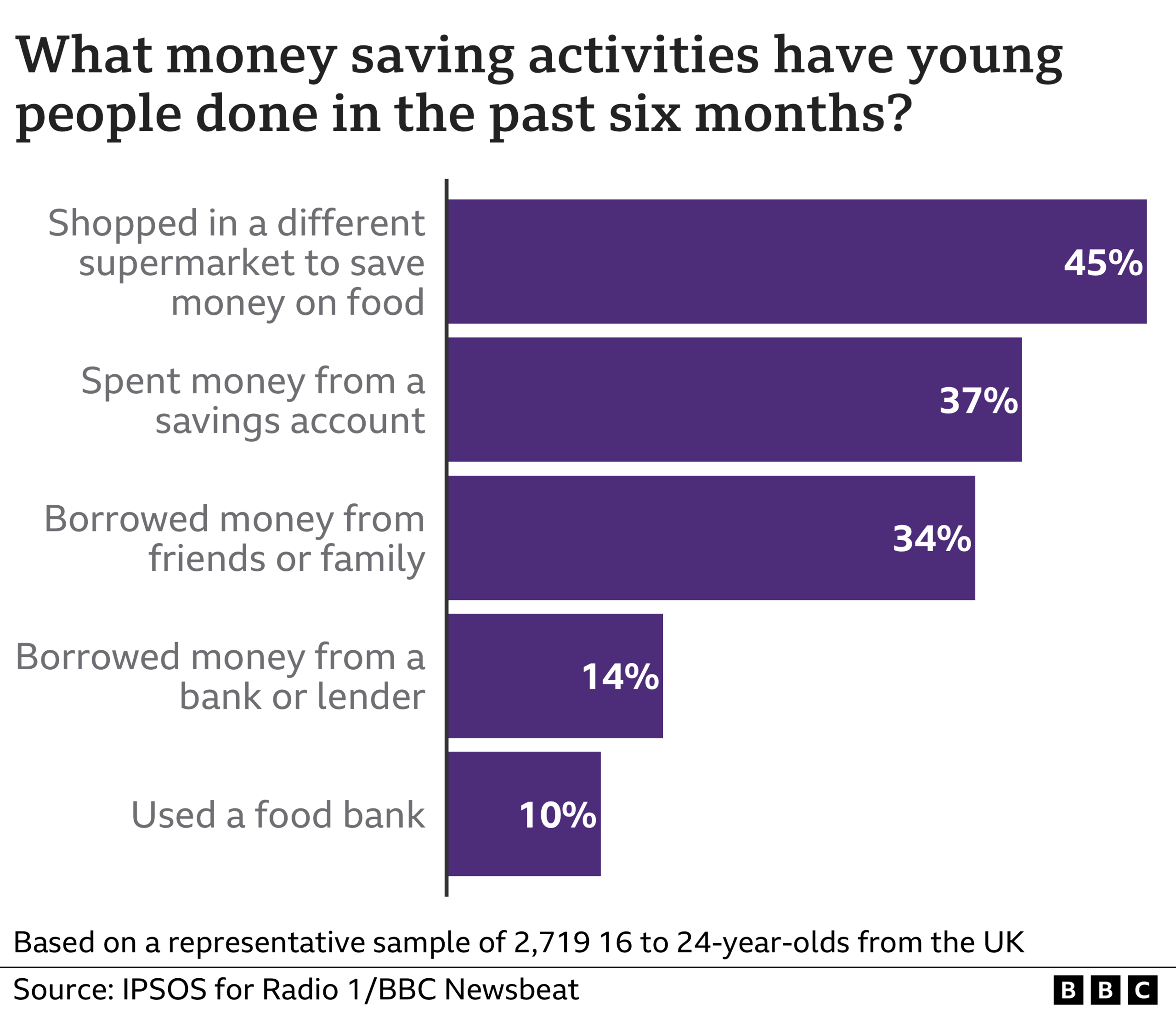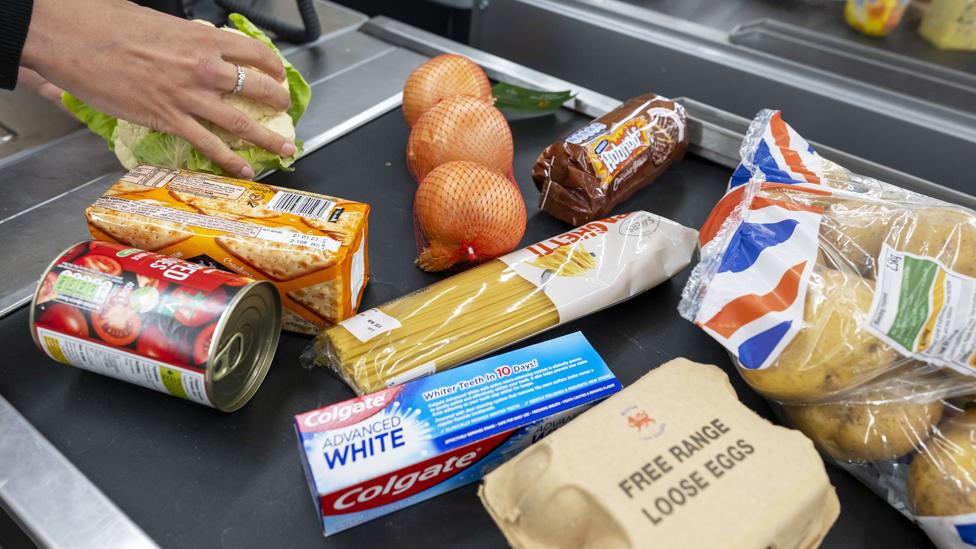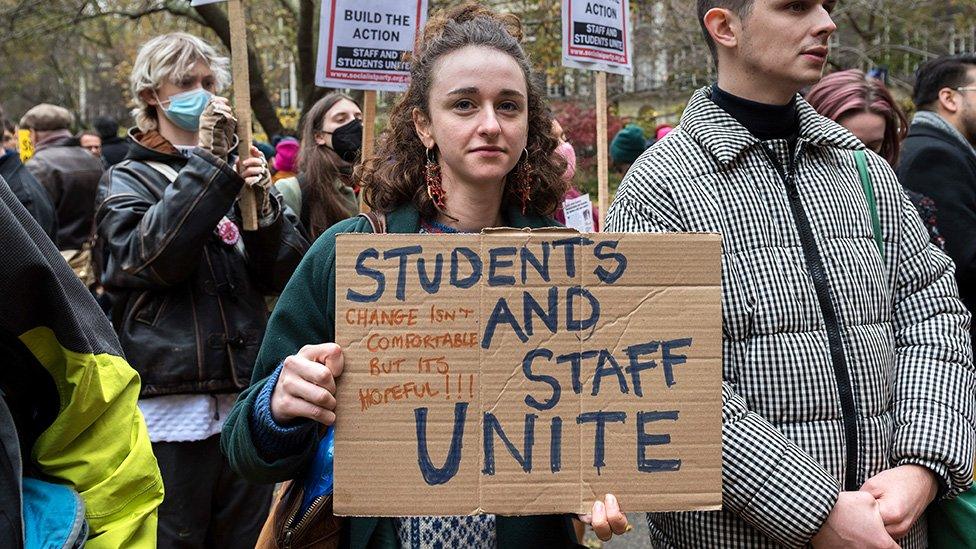Cost of living: NUS says university unions ramping up food help
- Published

The NUS says many students are struggling to cope with the increasing cost of food
University unions say they are having to step in to help students cope with the rising costs of food.
Free breakfasts, community kitchens, food pantries and vouchers are among measures introduced in some cities, with others looking at expanding help.
The National Union of Students (NUS) says its research suggests one in three survives on £50 or less a month.
Both the English and Welsh governments said they had increased funds to aid hard-up students.
BBC Newsbeat went to Swansea University, where the student union has been trialling weekly free breakfasts including tea, coffee, toast and croissants.
'I've cancelled Spotify'

Paige Stott (left) and friend Lucy Gallachar spoke to Newsbeat at the student union's first weekly free breakfast
Third year Paige Stott says her focus is on being able to afford the basics, and she's increased her hours at a part-time job.
"The cost has just shot up - food's a lot more money than it used to be," she says.
"You buy the bare minimum, like cereal, milk, bread. Even chicken's too expensive - I'm not eating that at the moment.
"I've cancelled Spotify and I don't have money for clothes at the minute - everything's gone up."
'I chose to live at home'
Trystan Thomas is in his first year studying medicine and says he's aware of students trying to help each other out.
"Personally I'm not finding it too difficult at the moment but I know others are. Things are more expensive, especially fruit and vegetables and protein as well.
"It's harder to eat healthily," he says.

Trystan Thomas and Lucy Thomas said they had to make tough choices because of rising prices
Lucy Thomas, who is also in her first year, chose to live at home 30 minutes away.
"I'm going out less and I try not to drive as much as petrol's so expensive," she says. "Plus parking is £4 a day for uni."
"Living at home means my mum still does a lot - I pay her a bit weekly but she still does all the food shopping.
"There's lot I don't have to do compared to if I was living independently."
Swansea student union president Esyllt Rosser says staff became concerned some would skip meals such as breakfast.
"Little things the union can do to alleviate those pressures makes a huge difference to a student's day and doesn't cost a lot of money," she says.
"It's a balance of what's achievable for us and what will have the most impact.
"We're also talking to the university about travel and heating bursaries and other big cost issues."
Swansea University said it has a student finance team to provide guidance and run budgeting workshops.
Italso oversees the hardship fund and says its assessment criteria have been reassessed for the current academic year in response to increasing living costs.
Aberystwyth, Durham, York, Kent, Newcastle, and Queen Mary University Edinburgh (QMU) are among other higher education institutions considering extra support or expanding what's on offer when it comes to food bills.
Fourth-year student Vasilia Todorova is vice president at the QMU campus pantry. It was started in April 2020 to help students during the first coronavirus lockdown and still runs every Wednesday.
"At first we were seeing about 20 students each week we were open but as of this term it's more like 35," she says.
"Students pay £2 a year to become a member and then £1 per visit. We offer tinned goods and fresh fruit and veg which is all donated through FairShare.
"We're just hopeful we're having an impact in helping students access quality food."
The comments follow a survey for the BBC which indicated one in 10 young people had used a food bank in the last six months.
The online poll, conducted by Ipsos, external on behalf of Radio 1 and BBC Newsbeat, asked a representative sample of 2,719 British young people - 16 to 24-year-olds - about their worries and concerns.

Chloe Field, NUS vice-president for higher education, said: "Food prices are up 15% on a year ago, student rent has soared and energy bills have doubled, but maintenance support has risen nowhere near in line with inflation and students have been completely ignored by a government lurching from crisis to crisis.
"One in three students is surviving on £50 or less a month after paying rent and bills, and more than half are spending less on food.
"So many are struggling to simply survive, never mind thrive, in their education."
Ms Field added: "The prime minister and his cabinet must put in place a tailored cost of living support package for students as a matter of urgency, and act to tie student support with inflation. Without action, no amount of budgeting will stop students from going hungry this winter."
The Welsh government says it's spending more than £1.6bn to help with the cost of living for students in Wales.
The Department for Education says it's increased maintenance loans in England every year, so disadvantaged students now have access to higher amounts than ever.
In Scotland, where students don't have to pay fees as in other UK nations, Education Minister Jamie Hepburn says the government's rent freeze will help those living in rented accommodation.


Follow Newsbeat on Twitter, external and YouTube, external.
Listen to Newsbeat live at 12:45 and 17:45 weekdays - or listen back here.
Related topics
- Published25 October 2022

- Published24 October 2022

- Published21 October 2022
